Philosophy Programs
Why Study Philosophy?
The Philosophy Program at UNF emphasizes a pluralistic approach to philosophical questions, traditions, and concerns. Our faculty are award-winning teachers and internationally recognized scholars engaged in cutting-edge research in analytic, continental, historical, and comparative or cross-cultural philosophy.
Do you enjoy asking questions? Thinking deeply? Arguing or debating issues great and small? Learning about new or different perspectives? Analyzing ideas? If so, philosophy might be for you. Our program offers two major and two minor programs. Each semester we offer a range of lower and upper division courses open to any UNF student, regardless of major. View our full course offerings in the UNF Course Catalog and check in with us for offerings in the current and upcoming terms. We aim to introduce students to philosophy in ways that will serve them well, professionally and personally, for wherever their lives may lead.
Visit Study the Humanities, an initiative of the National Humanities Alliance Foundation, to learn more about why humanities majors thrive, valued skills humanities majors develop, employment and salary data, see notable humanities majors who are now leaders in their chosen fields, hear from humanities majors across the country about the lifelong benefits of studying the humanities, and see research about how studying the humanities can help prepare you for a future career.
Watch this video to debunk some common myths about philosophy majors:
Students who study philosophy gain key skills for the rest of their lives:
- Critical, creative, and collaborative thinking
- Problem solving
- Argument identification, construction, analysis, and evaluation
- Clear and effective writing
- Strong oral communication
- Active and contemplative listening, impartial examination, and perceptive critique
- Critical reading skills
- Initiative and ability to work independently
- Identify and work with assumptions and values in your own culture and across cultures
- Teamwork and collaborative dialogue
- Articulate your own deepest questions and convictions
- Research skills
- Sifting complex information
- Leadership
- Reflection on values, ethics, and the nature of a flourishing life
- Love of learning
Undergraduate training in philosophy helps to prepare students for meaningful lives and successful careers.
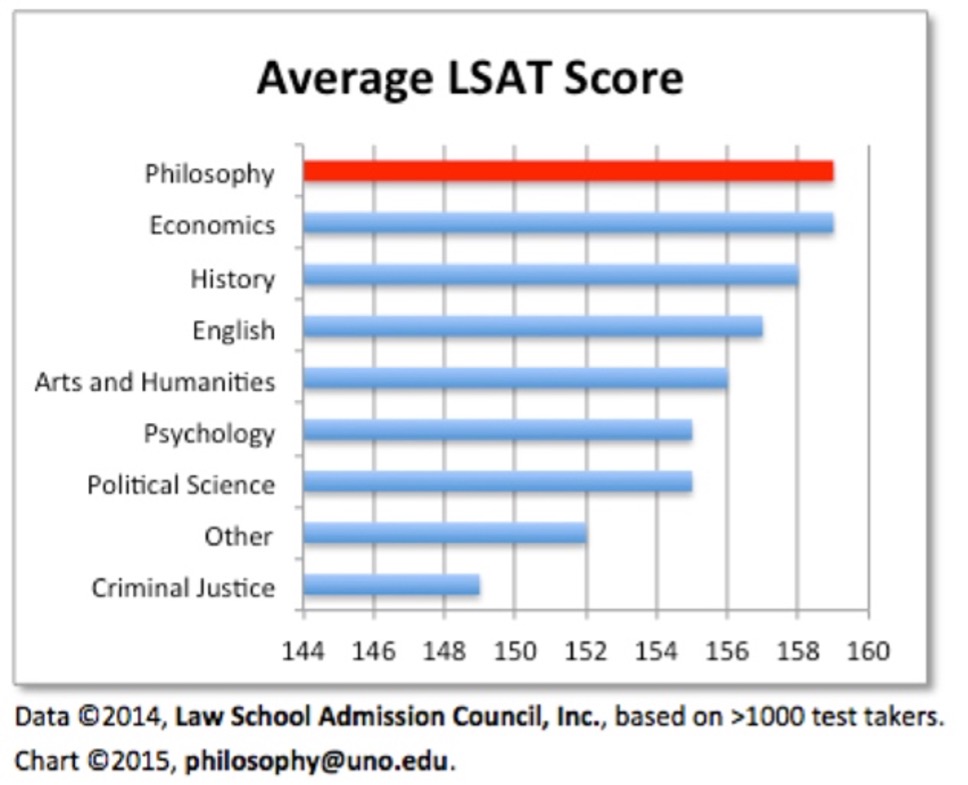
Are you thinking about graduate school? Did you know that philosophy majors consistently do the best of all majors on the LSAT and the MCAT, and rank higher than any other humanities major in scores on the GMAT and the GRE? In fact, there is evidence that an education in philosophy creates real improvements in academic skills, especially reading and writing, when compared with other majors. The Official Guide to U.S. Law Schools, Law School Admission Council says, “While no single curricular path is the ideal preparation for law school, you should choose courses that sharpen analytical reasoning and writing skills. Law schools prefer students who can think, read, and write well, and who have some understanding of what shapes human experience.” Philosophy is a great fit for those interested in law...and other graduate fields! Philosophy majors on average do better on the GRE (graduate entrance exam) than majors in psychology, sociology, history, chemistry, and mathematics (claim based on data from www.ets.org).
Did you know? Among people with undergraduate degrees, the median earnings of philosophy majors exceed those of majors in any other humanities field, and are the 16th highest among all majors, according to a recent U.S. study.
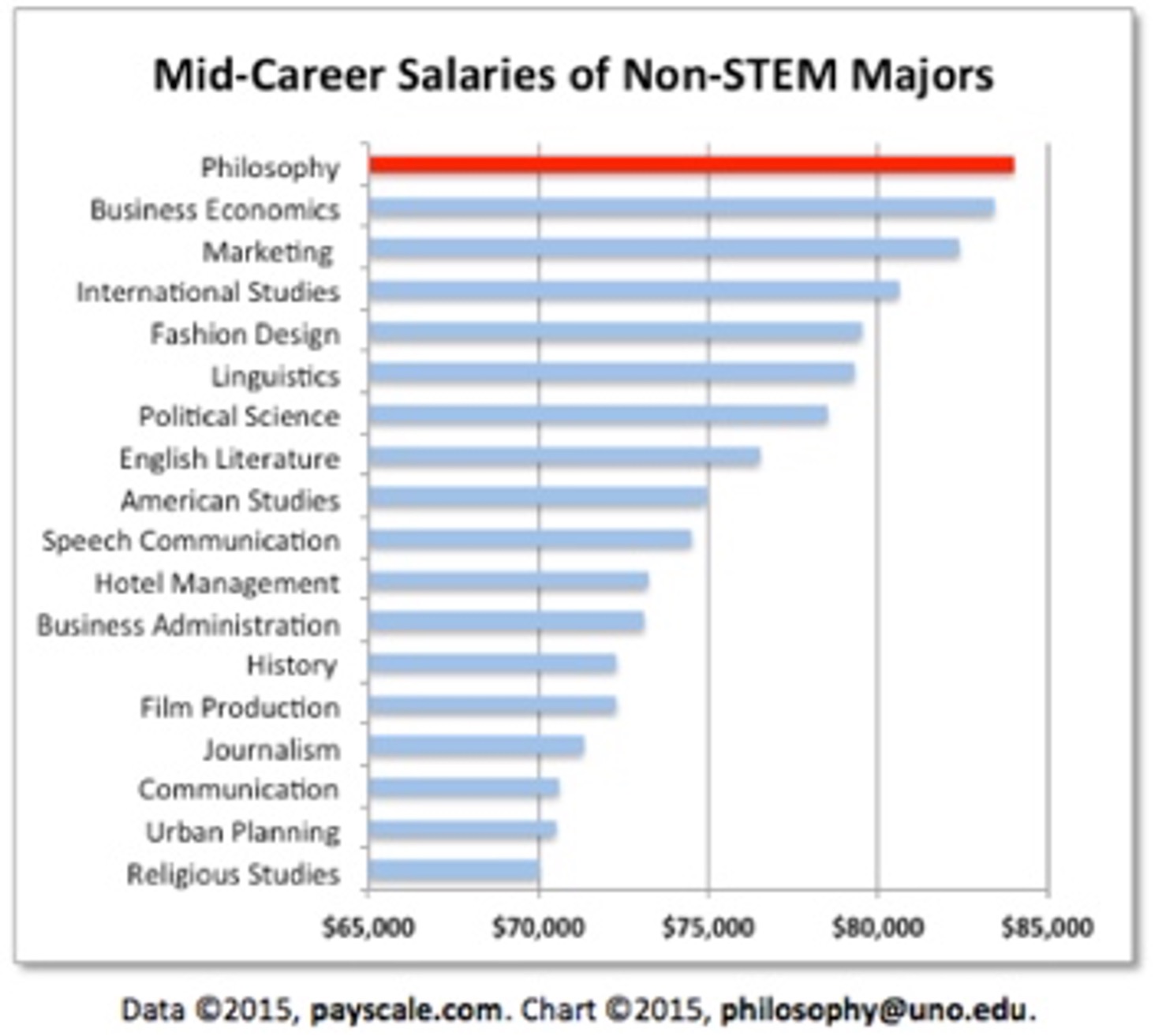
Mid career salaries of philosophers are also the highest among humanities fields, and come in above fields like Chemistry, Biology, and Communications. Learn more about this from Dr. Justin Weinberg, "Philosophy Majors Make More Money than Majors in any other Humanities Field," at the Daily Nous website.
Studying philosophy leads to a wide range of careers in fields including:
- Law
- Business
- Computing and Technology
- Education
- Engineering
- Finance & Banking
- Local, State, and Federal Government
- Non-Profit
- Insurance
- Journalism
- Media and Activism
- Marketing
- Medicine
- Literature, writing, and publishing
- Research: Business, Educational, Governmental
- Technical Writing
There are so many options for what you can do with a philosophy degree! Check out this US News and World Report "What you can do with a philosophy degree" or this Times Higher Education "What can you do with a philosophy degree" for more ideas.
Famous philosophy majors include:
- Thomas Jefferson
- Bruce Lee
- Stephen Colbert
- Pearl S. Buck
- Kumail Nanjiani
- Stephen Breyer
- Susan Sarandon
- Angela Davis
- Rev. Martin Luther King, Jr.
- Malala Yousafzai
- Philip K. Dick
- Jack Dorsey
- Reid Hoffman
- Harrison Ford
- Steve Martin
- Peter Thiel
- Carl Icahn
- Sheila Bair
- Patrick Byrne
- Your name here
Check out the American Philosophical Association website www.apaoline.org for more information on who studies philosophy.
Philosophy Major
The Philosophy Major consists in 11 courses (33 credit hours). Students are under no obligation to select a concentration; those who make no selection will automatically be assigned to General Philosophical Studies, which is our most flexible and varied path through the major. All students, regardless of concentration, must still complete all courses required for the major. Considering a double major? Philosophy is a great complement to many other majors. Talk with us for more information!
We encourage all of our majors to engage in experiential learning opportunities in the major, including undergraduate research, study abroad, directed readings, internships, and thesis work.
Beginning Fall 2024, new students declaring a philosophy major will be able to choose between two options: General Philosophical Studies and a concentration in Law, Politics, and Ethics.
Major: General Philosophical Studies
Students in this track are free to select their 15 elective hours (five courses) from any courses offered by the program; they are encouraged, however, to include in their program of study courses identified by the different philosophy prefixes--PHH, PHI, PHM, and PHP.
Concentration: Law, Politics, and Ethics
This concentration helps students to focus their philosophy coursework around issues, themes, and concerns prominent in law, politics, and ethics. Students planning careers in law, public affairs, theoretical or applied ethics, or those planning graduate work in social or political theory should consider this concentration.
View the Osprey Map [Course Sequence Guides] to keep on track for graduation. Osprey Maps should be used in consultation with an academic advisor after admission to UNF.
To declare the major, contact COAS Advising at ASADV@unf.edu or call at 904-620-2797.
Students who are already on Track 2, "Legal, Political, and Social Studies" or Track 3, "Studies in Applied Ethics" can choose to finish out their program on the track as it was or switch to the new concentration, "Law, Politics, and Ethics."
Philosophy Minor
The Department of Philosophy offers a minor in Philosophy and -- Coming Fall 2024 -- a minor in Law, Politics, and Ethics. Both minors are 15 credits.
- General Philosophy
- Law, Politics, and Ethics
- The coursework in this minor is tailored to those with specific interests in law, political philosophy, and theoretical or applied ethics.
Students in a current minor concentration (below) can stay in that concentration or elect to move to the general Philosophy minor or the new Law, Politics, and Ethics minor.
- Culture & Philosophy
- Applied Ethics
- Law & Philosophy
Current Courses
Spring 2026 schedule coming soon!
Experiential Learning
UNF Philosophy Majors participate in many different kinds of experiential learning, including but not limited to:
- One on one or small group work with faculty on directed independent study (DIS) or senior honors thesis
- COAS Summer Undergraduate Research Fellowships (pictured below)
- Collegiate Ethics Bowl
- High School Ethics Bowl coaching, judging, interning, and volunteering
- Internships (paid or non-paid) and volunteer positions in the community
- Peer mentoring at UNF
- UNF Ethics Academy Internships
- Department of Philosophy and Religious Studies Ambassador Internship
- Study Abroad (UNF students with the Giant Buddha in Chengdu, China, pictured below)
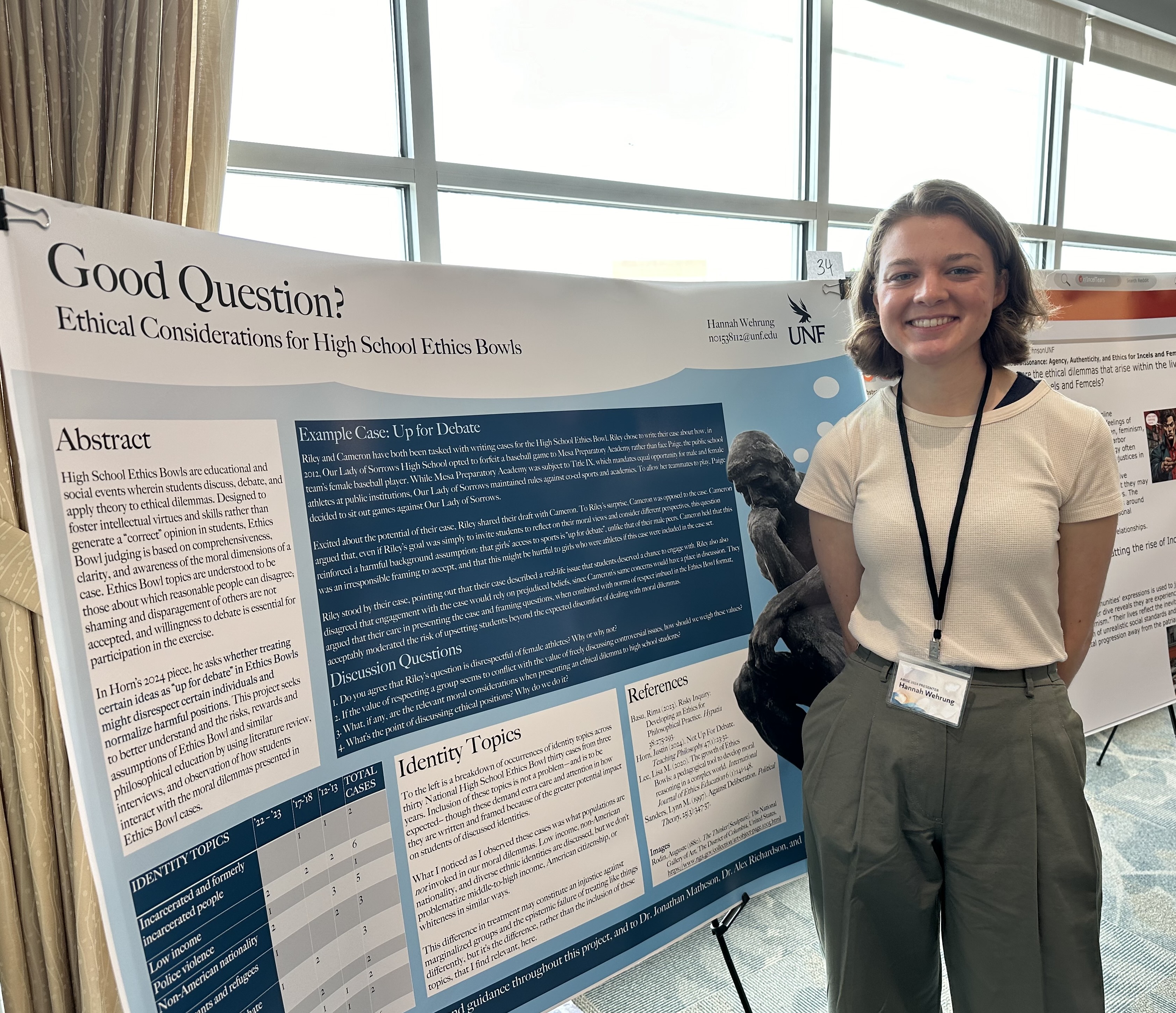
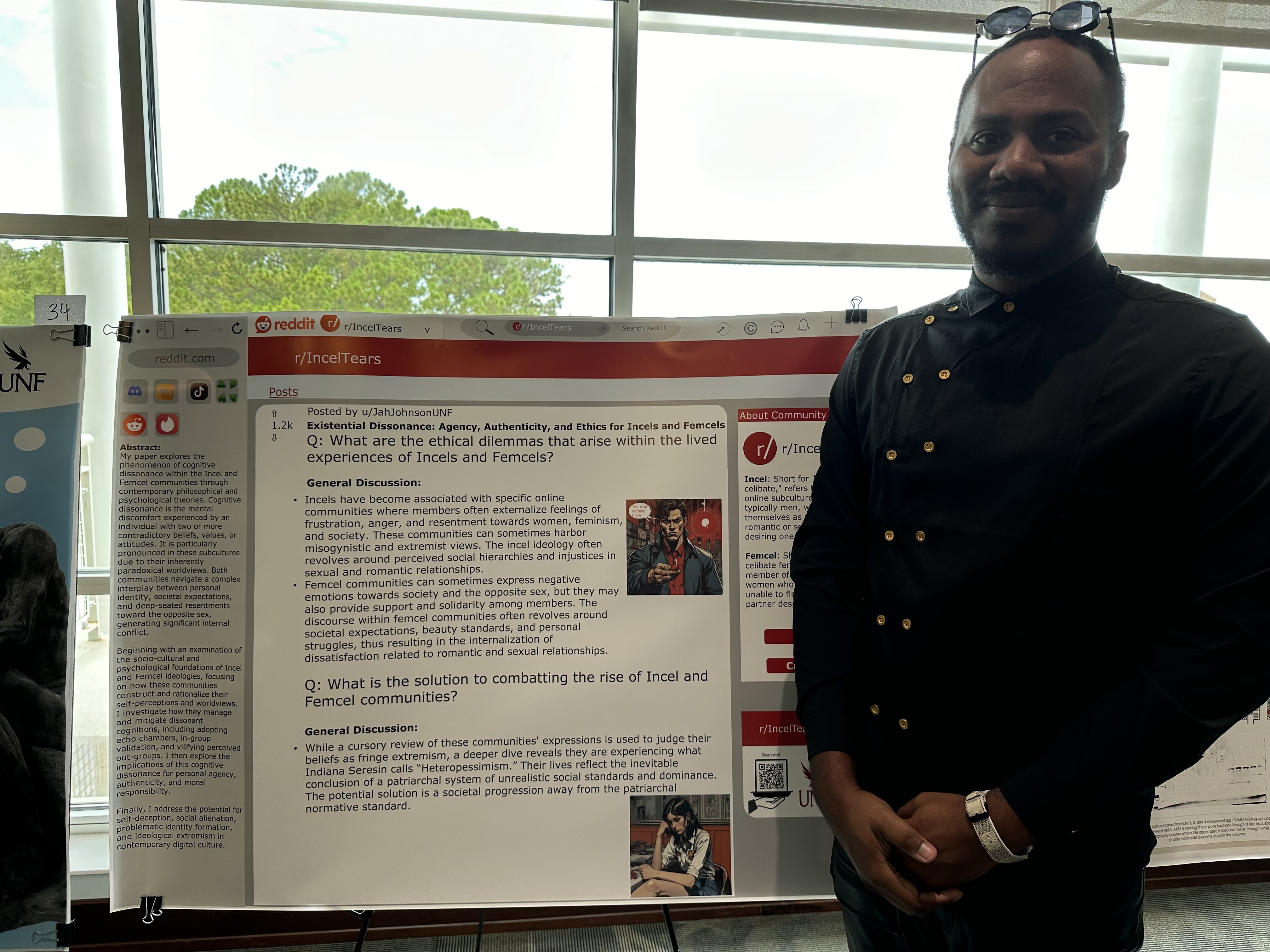

Are you interested in an internship?
Thinking about interning is a lot like thinking about career goals — the key factors are:
- What do you want to do? (e.g. how do you want to spend your time)
- What are you good at? (e.g. what skills do you have)
- How can you help/serve others?
You can intern through private opportunities or with Career Services. Getting an internship is a PROCESS that takes TIME: you should begin the process a semester before you plan to intern. If you are specifically interested in legal internships you should contact Dr. Lerner (UNF's Pre-Law Advisor) for access to the Pre-law Canvas page. Here are some steps to consider:
- Make an appointment with Career Services to create/revise your resume (https://www.unf.edu/careerservices/students/bookings.html). They can help you translate your experiences (paid, volunteer, classroom) into concrete skills internship sites and employers will recognize. You can learn more about Career Services in Canvas, or on their website: https://www.unf.edu/careerservices/
- Attend a Career Fair (talk to potential employers and internship opportunity folks)
- Identify 1+ sites that interest you, and work with Career Services to put together an application. NOTE: this can include sites that already have relationships with UNF or new sites. New sites take more time, but are doable.
- Identify a faculty mentor who can work with you to connect your internship experience to your philosophy coursework. Not sure where to start? Talk with Dr. Mattice (s.mattice@unf.edu)
- Sign up for PHI/REL 4990 for either 0 or 3 credits, depending on your needs and the details of your internship agreement.
- Intern! Have a fantastic learning experience.
UNF Philosophy students have interned at all kinds of different places. Remember, philosophy is a major that sets you up to do lots of different kinds of things for a career. Prior internship sites have included:
- Prosecutor's Office
- Attorney Offices
- City Ethics Board
- Arc Village
- Local schools
- Non-profit centers
- and more!
Another fantastic kind of experiential learning available to philosophy majors is Study Abroad. You can study abroad individually, through partner agreements UNF has with schools all over the world. You can do this while learning/practicing a foreign language (Spanish, French, German, Chinese, Japanese, ...), or entirely in English. You can also study abroad on a UNF sponsored program, with UNF faculty. Check out the International Center for more information: https://www.unf.edu/intlctr/ . Keep your eyes peeled for a study abroad program offered by Philosophy and Religious Studies faculty! And think about taking language courses to expand your options!
What do UNF students have to say about experiential learning in Philosophy?
Summer 2024 UNF Ethics Academy Internships
9 Interns, from rising sophomores to graduating seniors
Majors included philosophy, neuroscience, psychology, political science, environmental studies, and graphic design
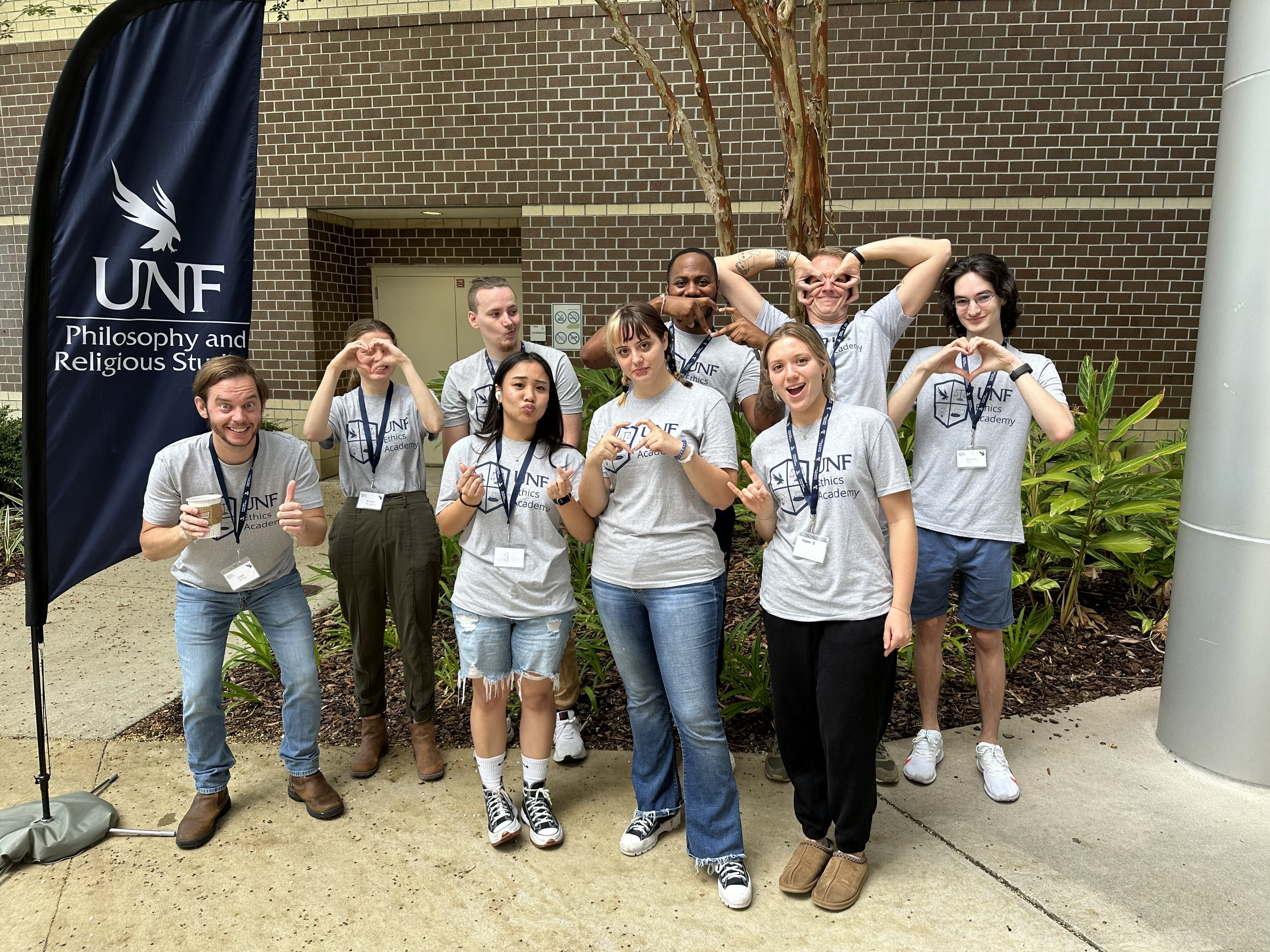
Intern reflection from Kyle Power: "I think the camp was a great success... There were many times I internally questioned whether the kids were enjoying themselves and learning. I really wanted to make sure the camp was as fun and impactful as it could be. After the final day, those fears were squashed. Seeing how much fun they had during the ethics bowl, how much they grew, and how sad they were to leave really touched my heart...T he intern group was great. I think the class was incredibly helpful in preparing us for the camp. Going through the matrix and knowing the structure made sure we could facilitate effectively. I feel like the interns were effective in facilitating in all the aspects. Especially considering some are younger and may not have experience leading discussions or public speaking. I would assume a big part of their success was the prep of smaller groups before the camp. It feels like we made a very strong bond as a group... The camp seemed… effective at creating interesting conversations, having fun, and making everyone learn. I definitely learned a lot from the kids, guests, interns, and teachers throughout the whole process."
Here is what Madison Mendiola had to say about her Summer 2023 internship at Jacksonville Legal Aid:
"As an aspiring law student, I’ve heard all about the benefits of getting an internship. Experience! Connections! Knowledge! All great and true things, no doubt. The lawyer I worked under was wise, patient and had a wonderful sense of humor; I would love to stay in contact with her in the future. I also learned a lot about the law, especially with probate cases. From homestead tax exemptions to the processes of formal notices, I saw both the abstract and the applied at play. Yet, as I think back to my time going into the office, my mind wanders to the ease of getting dressed in my fancy black shoes, walking with a crowd to differing shades of tall buildings, and passing through rooms filled with phone calls and keyboard clicking. The experience and practicum of briefly being given a role filled my passion for a dream I had but never fully realized. After my first day at the internship, I was convinced I had to work in an office and do lawyer-y things."
And here is what James Hayes had to say about his Summer 2023 Peer Mentorship experience working with incoming freshmen in Intro to Logic:
"What I learned most was the value of learning through teaching and group work. I feel as though I more deeply understood the material due to my experience working through homework with my classmates in a group setting where we could work together to solve the homework problems. It was equally edifying and gratifying to both work through problems that necessitated a collaborative approach amongst many students and also working one on one with students who may have been struggling with the homework. The opportunity to be a peer mentor has not only allowed me to feel confident in a basic understanding of SL, logic proofs, and the various related rules that are involved, but it has also taught me how to more clearly communicate and explain complex concepts. By the end of the semester, I felt as though I had learned how to convey complicated information in a way that could not only expand the knowledge base of a student but also, hopefully, expand their understanding as well."
UNF Ethics Academy Summer 2023 Interns:
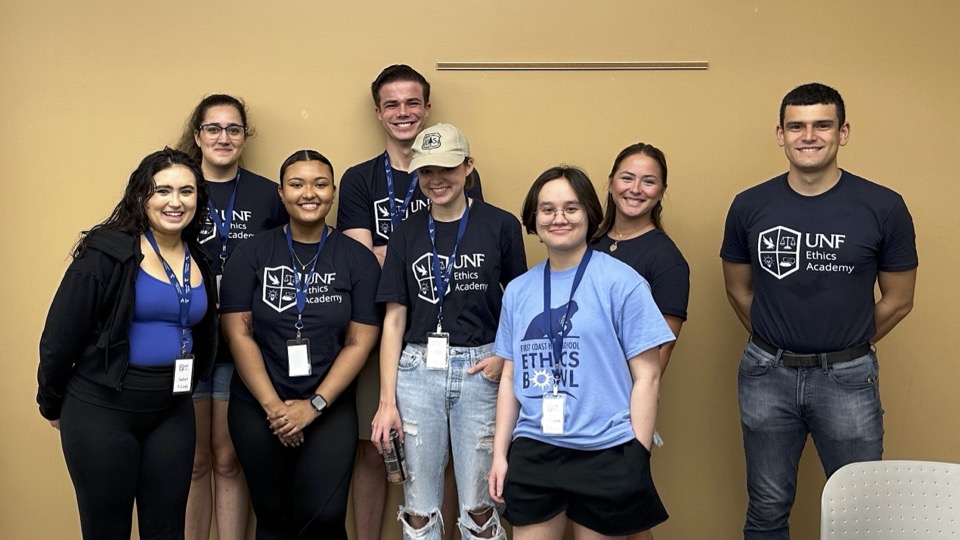
Madison Mendiola: "From the beginning, I was ecstatic about the idea of Ethics Academy. I loved judging for the First Coast Ethics competition, and I hoped the camp could get more students into Ethics Bowl... All in all, I love to see people being nerds, and there’s no better opportunity for that than a philosophy-centered summer camp. Learning about intellectual safety and gentle Socratic inquiry gave me a new perspective on being a discussion leader. As the leader, I have control over the pace of the conversation. This means that a good leader can keep conversation flowing, while also allowing for thoughtful silence. Meanwhile, an overly talkative leader can run the risk of speaking over the students. Creating an intellectual safe environment then allows the students to be free-thinkers, willing to be curious instead of searching for an approved answer. Working with my peers in the camp helped me see how a group leader should act. They would ask questions instead of giving answers, and dive into assumptions without being aggressive. Overall, the Ethics Academy taught me the difficulties but also the value found in leading an intellectual discussion."
Nathanael Coronado: "After thinking back on this Public Philosophy Leadership, I have gathered three important experience points that I focused on, and journaling of my own notes. The first experiential point being that I noticed that there is a necessity for a layout of philosophical ideas. The Moral Reasons Matrix, was the swiss army knife for this course. We first established an understanding of the Matrix as the team leaders to be familiar with its format and its strengths with certain ethical pnderies. What I realized is that certain discussions have a stronger hand in particular reasons, such as the consequentialist, deontological, or virtue having more points. This also helped strengthen my own preconceived options of only thinking from one viewpoint when approaching certain ethical questions. This made me have to approach the situation and dig for another reason outside of my standard train of thought."
Isabel Hiday: "This has been a great experience for me overall. I think I learned a lot about my personal thoughts on certain moral frameworks. I also learned more about my own leadership style and how to interact with high schoolers with respect while still letting them feel like they have their own ideas."
